BMW X1 vs Volvo EC40 - Differences and prices compared
Compare performance (326 HP vs 442 HP), boot space and price (38200 £ vs 46600 £ ) at a glance. Find out which car is the better choice for you – BMW X1 or Volvo EC40?
Costs and Efficiency:
Price and efficiency are key factors when choosing a car – and this is often where the real differences emerge.
BMW X1 has a evident advantage in terms of price – it starts at 38200 £ , while the Volvo EC40 costs 46600 £ . That’s a price difference of around 8392 £.
As for electric range, the Volvo EC40 performs decisively better – achieving up to 584 km, about 503 km more than the BMW X1.
Engine and Performance:
Under the bonnet, it becomes clear which model is tuned for sportiness and which one takes the lead when you hit the accelerator.
When it comes to engine power, the Volvo EC40 has a noticeable edge – offering 442 HP compared to 326 HP. That’s roughly 116 HP more horsepower.
In acceleration from 0 to 100 km/h, the Volvo EC40 is a bit quicker – completing the sprint in 4.60 s, while the BMW X1 takes 5.40 s. That’s about 0.80 s faster.
In terms of top speed, the BMW X1 performs evident better – reaching 233 km/h, while the Volvo EC40 tops out at 180 km/h. The difference is around 53 km/h.
There’s also a difference in torque: Volvo EC40 pulls evident stronger with 670 Nm compared to 477 Nm. That’s about 193 Nm difference.
Space and Everyday Use:
Cabin size, boot volume and payload all play a role in everyday practicality. Here, comfort and flexibility make the difference.
Both vehicles offer seating for 5 people.
In curb weight, BMW X1 is clearly perceptible lighter – 1575 kg compared to 2065 kg. The difference is around 490 kg.
In terms of boot space, the BMW X1 offers distinct more room – 540 L compared to 404 L. That’s a difference of about 136 L.
In maximum load capacity, the BMW X1 performs evident better – up to 1545 L, which is about 349 L more than the Volvo EC40.
When it comes to payload, BMW X1 to a small extent takes the win – 500 kg compared to 435 kg. That’s a difference of about 65 kg.
Who wins the race?
The Volvo EC40 proves to be leaves the rival little chance and therefore becomes our DriveDuel Champion!
Volvo EC40 is the better all-rounder in this comparison.
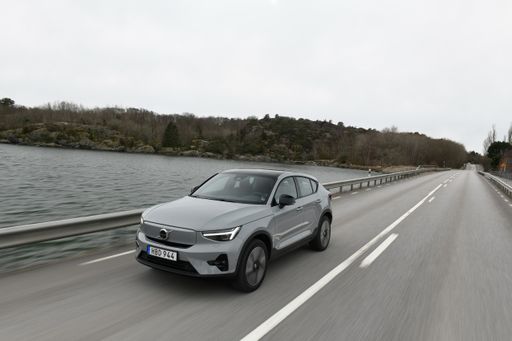
Volvo EC40
Costs and Consumption
View detailed analysis
Engine and Performance
View detailed analysis
Dimensions and Body
View detailed analysis
BMW X1
The BMW X1 brings a premium feel to compact crossover life, wrapping practical space and agile handling into a tidy, upscale package. It’s ideal for buyers who want BMW driving dynamics without the bulk, offering everyday comfort and a few clever tricks to keep the commute interesting.
details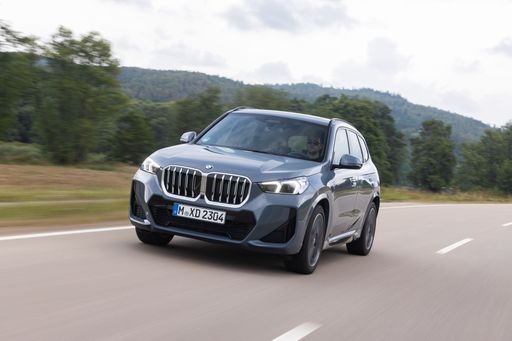
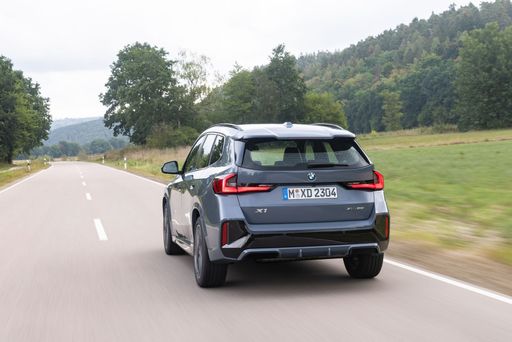
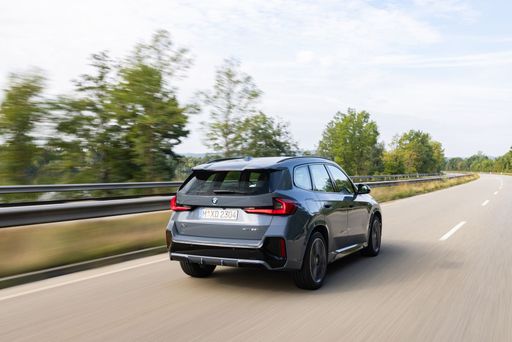
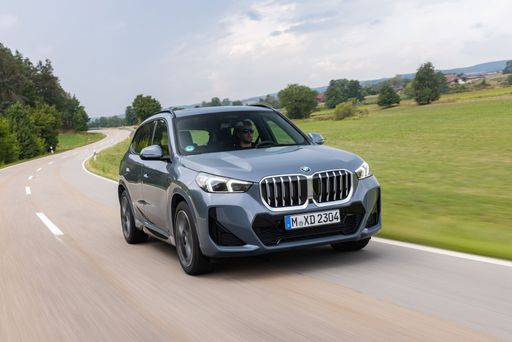
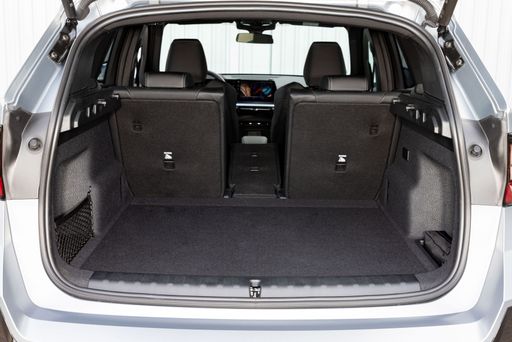
Volvo EC40
The Volvo EC40 feels like a polished slice of Scandinavian calm on wheels, blending minimalist design with a cocoon-like interior that makes everyday driving surprisingly serene. It’s an electric compact that puts safety and comfort front and center, while still injecting enough personality and tech-savvy charm to keep city buyers smiling.
details
Costs and Consumption |
|
|---|---|
|
Price
38200 - 55500 £
|
Price
46600 - 59000 £
|
|
Consumption L/100km
2.5 - 7.7 L
|
Consumption L/100km
-
|
|
Consumption kWh/100km
-
|
Consumption kWh/100km
16.2 - 17.3 kWh
|
|
Electric Range
81 km
|
Electric Range
488 - 584 km
|
|
Battery Capacity
14.20 kWh
|
Battery Capacity
67 - 79 kWh
|
|
co2
57 - 175 g/km
|
co2
0 g/km
|
|
Fuel tank capacity
47 - 54 L
|
Fuel tank capacity
-
|
Dimensions and Body |
|
|---|---|
|
Body Type
SUV
|
Body Type
SUV
|
|
Seats
5
|
Seats
5
|
|
Doors
5
|
Doors
5
|
|
Curb weight
1575 - 1935 kg
|
Curb weight
2065 - 2185 kg
|
|
Trunk capacity
490 - 540 L
|
Trunk capacity
404 L
|
|
Length
4500 mm
|
Length
4440 mm
|
|
Width
1845 mm
|
Width
1873 mm
|
|
Height
1630 - 1642 mm
|
Height
1591 mm
|
|
Max trunk capacity
1495 - 1545 L
|
Max trunk capacity
1196 L
|
|
Payload
490 - 500 kg
|
Payload
395 - 435 kg
|
Engine and Performance |
|
|---|---|
|
Engine Type
Diesel MHEV, Petrol MHEV, Petrol, Diesel, Plugin Hybrid
|
Engine Type
Electric
|
|
Transmission
Automatic
|
Transmission
Automatic
|
|
Transmission Detail
Dual-Clutch Automatic
|
Transmission Detail
Reduction Gearbox
|
|
Drive Type
Front-Wheel Drive, All-Wheel Drive
|
Drive Type
Rear-Wheel Drive, All-Wheel Drive
|
|
Power HP
136 - 326 HP
|
Power HP
238 - 442 HP
|
|
Acceleration 0-100km/h
5.4 - 9.2 s
|
Acceleration 0-100km/h
4.6 - 7.3 s
|
|
Max Speed
190 - 233 km/h
|
Max Speed
180 km/h
|
|
Torque
230 - 477 Nm
|
Torque
420 - 670 Nm
|
|
Number of Cylinders
3 - 4
|
Number of Cylinders
-
|
|
Power kW
100 - 240 kW
|
Power kW
175 - 325 kW
|
|
Engine capacity
1499 - 1998 cm3
|
Engine capacity
-
|
General |
|
|---|---|
|
Model Year
2024 - 2025
|
Model Year
2024
|
|
CO2 Efficiency Class
D, E, F, B
|
CO2 Efficiency Class
A
|
|
Brand
BMW
|
Brand
Volvo
|
Is the BMW X1 offered with different drivetrains?
The BMW X1 is offered with Front-Wheel Drive or All-Wheel Drive.




